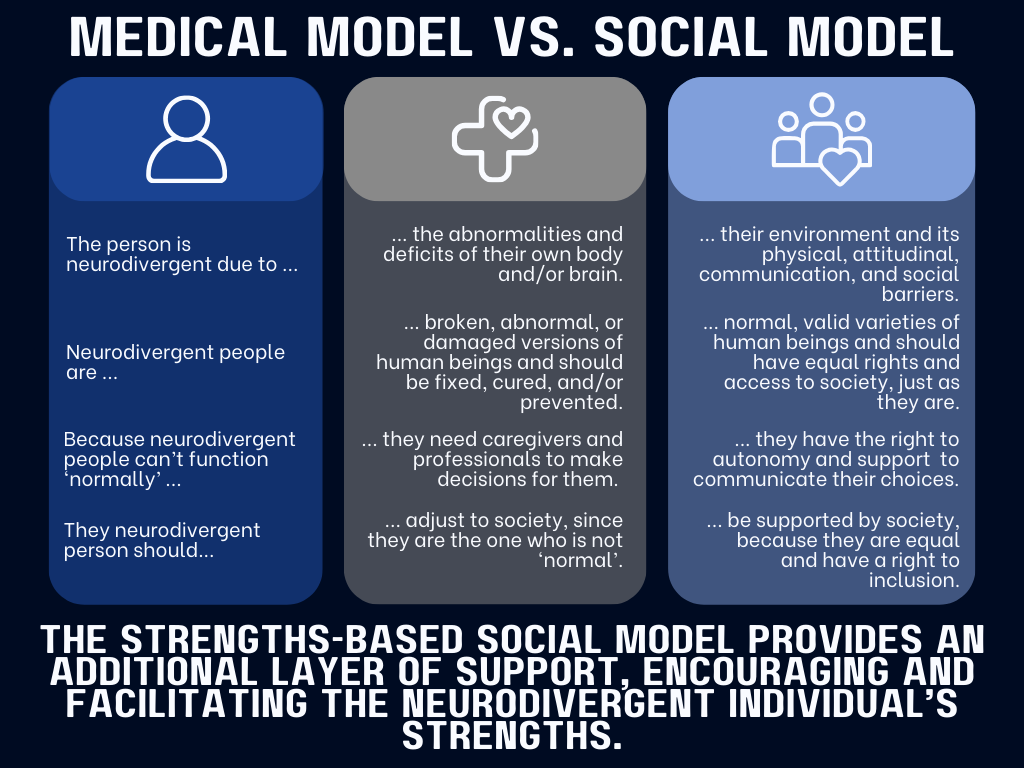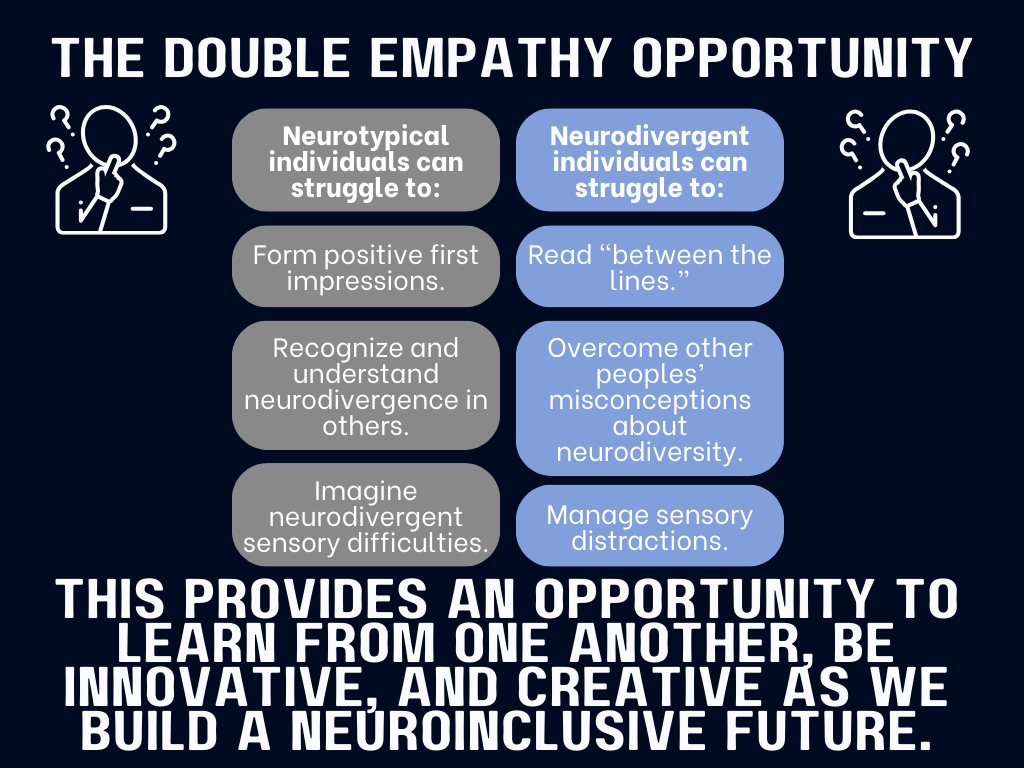
Welcome
Our mission: The Frist Center for Autism and Innovation at the Vanderbilt University School of Engineering brings together leading engineers, business scholars, academic researchers, and experts in educational and clinical practice, in partnership with self-advocates and other civic stakeholders, to maximize neurodiverse talent within and into the workforce. From a strengths-based understanding of neurodiversity that honors lived experiences by driving real needs-based solutions, the Center sees opportunities for innovation in technology, business models, talent development, future-leader training, and workplace practices.
We are housed in the School of Engineering at Vanderbilt University, where we bring together academics and higher education professionals, inventors and entrepreneurs, business scholars and management experts, and self-advocates and civil stakeholders to work together to understand, maximize, and promote neurodivergent talent.
From a social-strengths based perspective of neurodiversity, the Center sees opportunities for innovation in technology, talent acquisition and development, workplace practices, and education.
The Frist Center is a research center and does not engage in clinical practice (i.e., we do not provide diagnostic care). If you are searching for support with receiving a diagnosis for yourself or someone you love, please navigate to this page.



We work with Academics and other professionals in higher education to develop and prepare the next generation of engineers, business leaders, special education and clinical practitioners, and students across all other relevant domains to bring a “neurodiversity paradigm” to all whose lives they will touch and everything they will invent, create and do.
We work with inventors and entrepreneurs to develop and commercialize new technologies, algorithms, and systems that enable neurodiverse people to gain employment, succeed at work, and achieve their full potential.

We work with business scholars and management experts to develop and deploy novel pipelines to careers, workplace practices and tools, corporate trainings, and policies that dramatically increase neurodiverse talent in the workforce and meaningfully advance neurodiversity in leadership.

We work with self-advocates and other civic stakeholders to ensure that everything the Center undertakes is done with the engagement—the centering—of neurodiverse people, voices, lived experiences, and perspectives.
Frist Center End-to-End Employment Pipeline Model

The Frist Center for Autism and Innovation was formed from its inception in 2017 with the intention of serving as the core academic research partner within a larger, community-based effort to develop a truly end-to-end employment pipeline model. In this model, we seek to develop, demonstrate, and disseminate components necessary for a community to come together to create a robust series of pathways and opportunities that lead to meaningful employment for autistic individuals and that enhance the bottom line for the businesses.
This “pipeline to employment” model helps the Frist Center identify roadblocks to meaningful employment faced by many individuals with autism and work with partners throughout the community to identify or develop programs and innovations that may help individuals succeed in overcoming these obstacles.
There are a lot of unknowns in science, particularly when it comes to neurodiversity, but what is clear is many in the neurodiversity community are looking for employment help. We examine each program and innovation to get a sense of its potential to have a positive impact. For those that show promise, we help facilitate pilot projects so we may try to help those who need it today, while examining the results with a scientific lens so we can determine what works and what doesn’t. Once a program or innovation has been vetted, we incorporate it into the pipeline model.
Simply put, the model is a collection of programs and innovations that help neurodiverse individuals understand their own talents, obtain appropriate training and upskilling (including soft skills) for workplace readiness through educational programs and novel assistive technologies, find meaningful employment, and land in workplaces that themselves have been trained in evidence-based management methods for true neuro-inclusion at work.

The medical model of disability sees disability as an individual health condition or problem that needs to be fixed or cured. It focuses on diagnosing and treating the impairments or limitations that a person has, often through medical interventions such as surgeries, medications, or therapies. This model places the responsibility for addressing disability on the individual, rather than considering the role of societal barriers and attitudes. In essence, it views the person as the problem that needs to be fixed, rather than recognizing and addressing the systemic and environmental factors that can limit their full participation in society.
The social model of neurodiversity refers to the approach of understanding and accepting neurological differences, such as autism, ADHD, dyslexia, and others, as natural variations in the human brain. It seeks to move away from pathologizing these differences and instead focuses on providing support, accommodations, and acceptance to individuals with diverse neurological profiles. In essence, it encourages society to embrace and celebrate neurodiversity rather than trying to force everyone to fit into a narrow definition of "normal." This model recognizes that each person's brain functions in unique ways and that such differences should be respected and valued.
The strengths-based model of neurodiversity is an approach that focuses on identifying and leveraging the unique strengths and abilities of individuals with diverse neurological profiles, such as autism, ADHD, dyslexia, and others. Instead of viewing neurodivergent traits as deficits or challenges, this model emphasizes recognizing and nurturing the specific talents and capabilities that individuals possess. It involves identifying and building on the strengths of each person, allowing them to contribute to society in meaningful and valuable ways. By emphasizing and celebrating the diverse strengths and abilities of neurodiverse individuals, this model aims to create a more inclusive and supportive environment where everyone's contributions are valued.
At the Frist Center we work with a compounded model of the social and strengths based approach: the social-strengths model. This model seeks to employ the best parts of both models to enable success in all education and career stages for a neurodivergent individual. We note, we do not dismiss the medical model, and understand its utility in the neurodiverse community.
The Double-Empathy Opportunity

The double-empathy problem refers to the difficulty that people with different neurotypes (such as autistic and non-autistic individuals) may have in understanding each other's emotions and experiences. It suggests misunderstandings and communication barriers can occur because their neurotype influences each person's perception and expression of emotions. This concept highlights the importance of mutual empathy and understanding in bridging the gap between different neurotypes and improving communication and relationships.
At the Frist Center, we reframe the double-empathy problem as a double-empathy opportunity. We work to support both sides, the neurotypical and neurodivergent individuals, in learning and innovating together. We combine our different ways of thinking to create novel approaches for the future.

